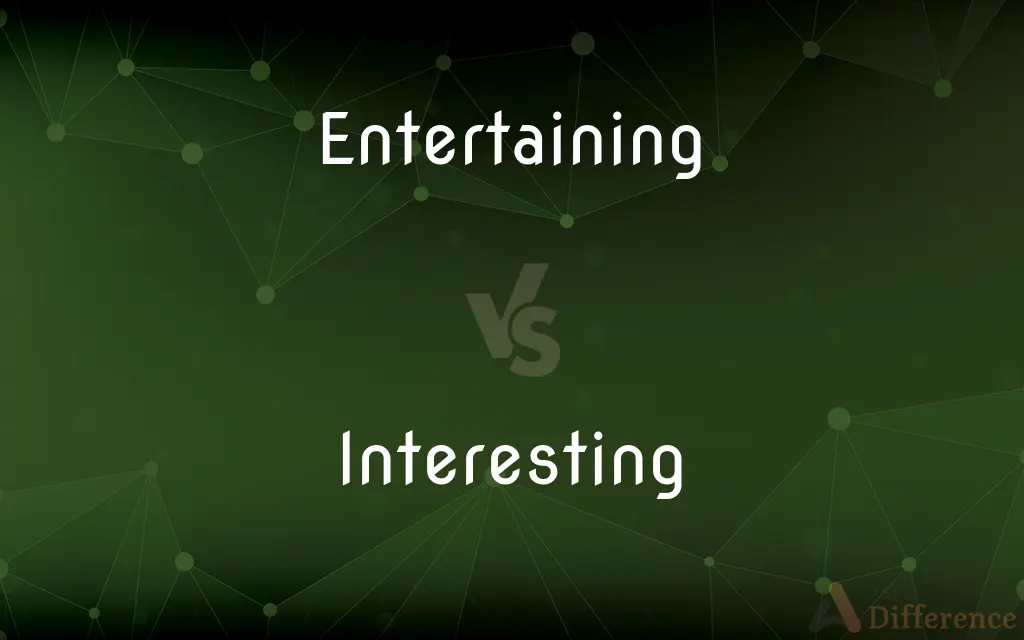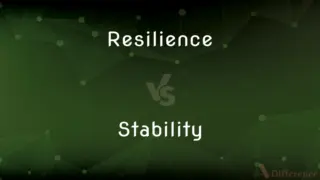Entertaining vs. Interesting — What's the Difference?
Edited by Tayyaba Rehman — By Urooj Arif — Updated on May 9, 2024
Entertaining content captivates and amuses, often providing enjoyment and relaxation, whereas interesting content engages and stimulates curiosity, primarily through thought-provoking or informative elements.

Difference Between Entertaining and Interesting
Table of Contents
ADVERTISEMENT
Key Differences
Entertaining content is designed to amuse, delight, and provide pleasure. It often includes elements of humor, drama, or excitement that are specifically tailored to captivate an audience's attention and provide a diversion from daily life. Whereas, interesting content holds the audience's attention through intriguing facts, compelling arguments, or novel ideas, appealing to a sense of curiosity and the desire for knowledge.
While entertaining content can include movies, games, and performances that focus on fun and enjoyment, interesting content often involves documentaries, lectures, and books that enrich the mind and provoke deeper thinking. On the other hand, these types of content can overlap when elements of entertainment are used to make the delivery of interesting content more appealing.
Entertainment often relies on emotional responses, such as laughter, suspense, or excitement, making it a popular choice for social gatherings and leisure activities. Conversely, interesting content tends to engage the intellectual faculties, encouraging analysis, discussion, and reflection, making it suitable for educational settings or personal growth.
The goal of entertaining content is typically to provide an escape from reality and give people a break from their routine or stress. In contrast, interesting content aims to add to one’s understanding of the world, presenting challenges to existing viewpoints or expanding one's perspective on a particular subject.
Comparison Chart
Primary Goal
To amuse and delight
To engage and stimulate curiosity
ADVERTISEMENT
Typical Formats
Movies, games, shows
Documentaries, lectures, articles
Emotional Appeal
High, evokes laughter or excitement
Moderate, evokes contemplation
Audience Engagement
Emotional and passive
Intellectual and active
Typical Context
Leisure and social activities
Educational and personal growth
Compare with Definitions
Entertaining
Providing amusement or enjoyment.
The clown at the birthday party was highly entertaining.
Interesting
Provoking thought through unique or complex ideas.
The science fair had many interesting projects that showcased innovative thinking.
Entertaining
Enjoyable and diverting.
The new comedy series is light and entertaining, perfect for unwinding.
Interesting
Arousing curiosity or interest.
The lecture on ancient civilizations was incredibly interesting.
Entertaining
Capable of holding the interest of an audience with fun.
The magician’s act was surprisingly entertaining and engaging.
Interesting
Holding attention by being unusual or exciting.
I found the article on black holes very interesting and thought-provoking.
Entertaining
Pleasing to an audience, often through lively and playful content.
Her storytelling style is very entertaining, keeping everyone captivated.
Interesting
Engaging the intellect or emotions.
Her discussion on the impact of technology was quite interesting.
Entertaining
Designed to captivate and hold the attention through pleasure or amusement.
The action-packed movie was entertaining and kept us on the edge of our seats.
Interesting
Worthy of attention; not dull.
The book provides interesting insights into human psychology.
Entertaining
Agreeably diverting; amusing
They staged an entertaining puppet show.
Interesting
Arousing curiosity or interest; holding or catching the attention
An interesting debate
It will be very interesting to see what they come up with
Entertaining
Very amusing; that entertains.
Interesting
Arousing or holding the attention; absorbing.
Entertaining
Present participle of entertain
Interesting
(obsolete) Of concern; affecting, important.
Entertaining
(archaic) Entertainment.
Interesting
Arousing or holding the attention or interest of someone.
Entertaining
Affording entertainment; pleasing; amusing; diverting.
Interesting
(euphemistic) Pregnant.
Entertaining
Agreeably diverting or amusing;
An entertaining puppet show
Films should be entertaining
Interesting
Present participle of interest
Interesting
Engaging the attention; exciting, or adapted to excite, interest, curiosity, or emotion; as, an interesting story; interesting news.
Interesting
Arousing or holding the attention
Common Curiosities
What makes content entertaining?
Content is entertaining if it effectively amuses and engages an audience, often through humor, drama, or thrilling elements.
What type of content is typically found interesting?
Content that presents new information, challenges preconceived notions, or introduces novel perspectives is typically found interesting.
How does interesting content differ from entertaining content?
Interesting content stimulates the mind and provokes thought, focusing more on intellectual engagement than purely emotional or sensory enjoyment.
What are some examples of entertaining activities?
Examples include watching films, attending concerts, or playing video games, all of which provide enjoyment and relaxation.
What impact does entertaining content have on viewers?
Entertaining content often leaves viewers feeling relaxed and amused, providing a break from the routine stresses of life.
Can content be both entertaining and interesting?
Yes, many forms of content, such as educational documentaries or thought-provoking films, blend both elements to both educate and entertain audiences.
What role does curiosity play in making content interesting?
Curiosity drives the desire to learn more and engage with content on a deeper level, making it a key component of interesting material.
Can interesting content be a tool for social change?
Yes, interesting content that exposes societal issues or educative facts can motivate individuals to think critically and advocate for change.
Why is it important for educational materials to be interesting?
Interesting educational materials capture and retain attention, making learning more effective and enjoyable.
How do creators make educational content entertaining?
By incorporating storytelling, visual aids, and interactive elements, creators can make educational content more engaging and entertaining.
What are the benefits of consuming interesting content?
Consuming interesting content can enhance knowledge, stimulate critical thinking, and broaden one’s worldview.
Why might someone prefer interesting content over entertaining content?
Some individuals may prefer content that enriches their knowledge or skills over content that primarily aims to entertain, especially for personal or professional growth.
What factors influence whether content is interesting or entertaining?
Factors include the audience’s preferences, the context in which the content is consumed, and the creator’s objectives.
How can one increase the entertainment value of a presentation?
By adding humor, interactive elements, or multimedia content, the entertainment value of a presentation can be significantly increased.
How do personal interests affect perceptions of what is interesting?
Personal interests and background significantly influence what an individual finds interesting, as they align with existing passions or curiosity areas.
Share Your Discovery

Previous Comparison
Resilience vs. Stability
Next Comparison
Endorsement vs. ApprovalAuthor Spotlight
Written by
Urooj ArifUrooj is a skilled content writer at Ask Difference, known for her exceptional ability to simplify complex topics into engaging and informative content. With a passion for research and a flair for clear, concise writing, she consistently delivers articles that resonate with our diverse audience.
Edited by
Tayyaba RehmanTayyaba Rehman is a distinguished writer, currently serving as a primary contributor to askdifference.com. As a researcher in semantics and etymology, Tayyaba's passion for the complexity of languages and their distinctions has found a perfect home on the platform. Tayyaba delves into the intricacies of language, distinguishing between commonly confused words and phrases, thereby providing clarity for readers worldwide.
















































